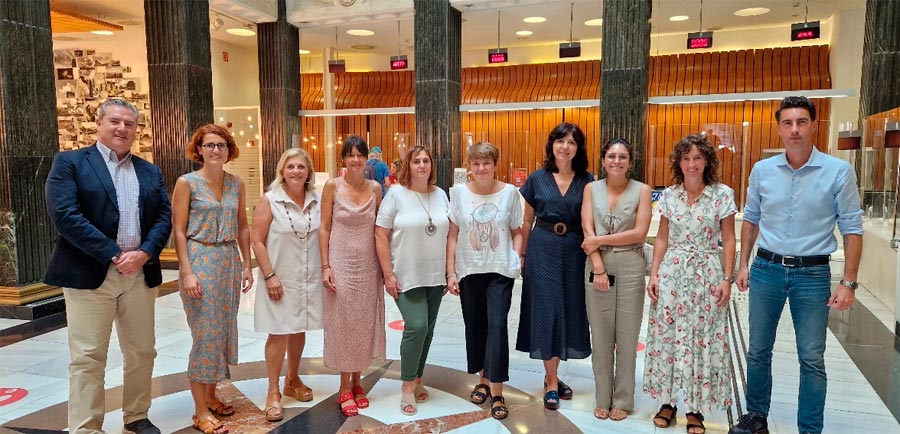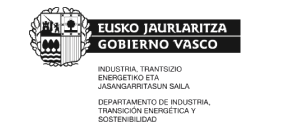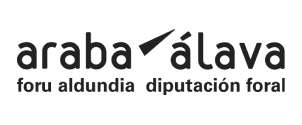05 March 2024

Bilbao Ekintza work team together with Orkestra researchers.
Bilbao Next Lab, one of Orkestra's longest-running projects, which recently celebrated its 10th anniversary, is Bilbao's urban competitiveness policy laboratory. Since 2013, this laboratory, promoted by Bilbao Ekintza-Bilbao City Council and facilitated by Orkestra, has made it possible to define and implement Bilbao's urban smart specialisation strategy through different projects involving a variety of agents.
Bilbao Next Lab has also been the basis on which Orkestra has developed its line of research on urban competitiveness within the Institute. This line of research is based on three fundamental pillars:
- the recognition of the multi-scale nature of territorial competitiveness, to which contributions can be made from different territorial levels, including cities.
- action-research for territorial development (ARDT) as the main methodological approach to promote urban competitiveness and assuming, by the research team, a non-neutral position as actors in the territory.
- Orkestra's competitiveness framework as a key reference for conceptualising the urban competitiveness model promoted by Bilbao Next Lab.
10 years of the proyect: Bilbao Next Lab
Xabier Ochandiano, Councillor for Economic Development, Trade, Tourism and Employment at the Bilbao City Council, and Miren Estensoro, senior researcher at Orkestra, are the two people who have been working the longest on the project.
In this post written by both of them, they recall the trajectory of the project over the last 10 years and reflect on the contribution of a research institute such as Orkestra to the city's competitiveness policy.

Bilbao Next Lab: 10 years of the urban competitiveness policy laboratory through accion-research
Bilbao Next Lab TODAY
Bilbao Next Lab's current lines of work aim, through action-research for territorial development (ARDT), to tackle different competitiveness challenges. Due to the city’s level of specialization in Knowledge Intensive Business Services (KIBS), this sector is a fundamental focus of the city's competitiveness policy since the beginning of BNL:
- Design and facilitation of collaborative governance. The aim of this line of work is to support the development of Bilbao Ekintza team's facilitation capabilities for the launch and implementation of collaborative governance. The main focus of the different collaborative governance areas are the competitiveness challenges of KIBS: the connection with industry; the creation of employment and talent; the creation of testing environments for KIBS solutions; or, the development of the Zorrotzaurre Urban Innovation District as a KIBS hub.
In this post, members of the Bilbao Next Lab team and Orkestra reflect on this line of work and the corresponding action-research process.

Bilbao Next Lab hoy: retos para facilitar la gobernanza colaborativa
- KIBS talent. The high employment demand in KIBS has led to the need to explore new ways of developing specialised talent. Vocational training, along with the connection between different training systems and an integrated approach to creating quality jobs, are the ways that are being explored and developed together with key stakeholders such as the Basque Government's Department of Education, the Provincial Council of Bizkaia, advanced services companies and training centres, among others. The following video is an example of the process that has been underway since 2018 and includes the testimonies of some of the people involved to show the multi-stakeholder nature of the process for employment in advanced services in KIBS and has led to the need to explore new ways of developing specialised talent. Vocational training, along with the connection between different training systems and an inclusive approach to the creation of quality jobs, are the ways that are being explored and developed together with key stakeholders such as the Basque Government's Department of Education, the Provincial Council of Bizkaia, advanced services companies and training centres, among others.
- Connection with the industrial fabric is one of the key competitiveness challenges for the development of of KIBS. This connection is also one of the key competitiveness factors for manufacturing territories such as the Basque Country. Bilbao Next Lab is working on analysing the state of this link and the factors that can facilitate it. A UNIC project, in collaboration with the University of Bochum (Germany), is an example of Orkestra's contribution to this line of work.
Notable publications resulting from the project
Throughout these 10 years and as a result of the action research processes, Orkestra's research team has generated a large number of publications around the four lines of research linked to urban competitiveness.
Governance for the sustainable and inclusive urban competitiveness
- Overcoming policy making problems in smart specialization strategies: engaging subregional governments
- Multilevel governance for smart specialisation: basic pillars for its construction
- Relevancia del agente dinamizador para la creación de alianzas que impacten positivamente en el territorio. (Capítulo libro: Alianzas inteligentes para la transformación competitiva de las organizaciones)
- Facilitation of Entrepreneurial Discovery Processes by Policymakers: an Actionable Definition of Roles and Challenges
- Ciudades y especialización inteligente sostenible. (Capítulo libro: Ciudades inteligentes, ciudades sabias)
- El papel de los gobiernos urbanos para la co-creación de políticas públicas con el colectivo joven. (Capítulo libro: Ciudades para vivir)
Talent
- El rol de la Formación Profesional en los Servicios Avanzados
- Vocational Education and Training and Knowledge Intensive Business Services: A Promising Relationship in the Digital Era
- El rol de la Formación Personal en las empresas digitales
- The Role of Action Research in Democratizing Governance: The Case of Bilbao Next Lab
- The role of Vocational Training in ICT firms: the revelation
- Las Estrategias de Especialización Inteligente como instrumento para la creación de talento a nivel local: el caso de Bilbao (Capítulo libro: Modelando el futuro del empleo en Europa: Innovación Social como un motor para el cambio social)
Advaced services
- Localización de los Servicios Empresariales Intensivos en Conocimiento en regiones manufactureras: el caso del País Vasco y sus entornos urbanos (Capítulo en: Kibs y transferencia de conocimiento desde una perspectiva de internacionalización)
Action-research
- Action Research for Urban Development: the case of Bilbao (Capítulo en: Roots and Wings of action research for territorial development)
- Bridging between Action Research Communities: A Pathway to Connectivity












